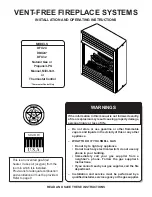
Heat & Glo • TRUE-36-IFT, TRUE-42-IFT, TRUE-50-IFT Installation Manual • 2461-980 Rev. Q • 11/20
20
C
J
B
D
B
F
B
A
E
V
V
V
V
V
V
M
H or i
V
G
X
V
H
A
V
V
H
B. Chimney Diagram
O
N
P
R
Q
Electrical
Service
V
K
V
K
V
L
C
V
X
= AIR SUPPLY INLET
V
= VENT TERMINAL
= AREA WHERE TERMINAL IS NOT PERMITTED
Q
MIN
R
MAX
1 cap
3 feet
2 x Q
ACTUAL
2 caps
6 feet
1 x Q
ACTUAL
3 caps
9 feet
2/3 x Q
ACTUAL
4 caps
12 feet
1/2 x Q
ACTUAL
Q
MIN
= # termination caps x 3 R
MAX
= (2 / # termination caps) x Q
ACTUAL
Covered Alcove Applications
(Spaces open only on one side and with an overhang)
CAUTION! Risk of Burns! Termination caps are HOT,
consider proximity to doors, traffic areas or where people
may
pass or gather (sidewalk, deck, patio, etc.)
. Listed cap
shields available. Contact your dealer.
• Local codes or regulations may require different
clearances.
• Vent system termination is
NOT
permitted in screened
porches.
• Vent system termination is permitted in porch areas with
two or more sides open.
• Hearth & Home Technologies assumes no responsibility
for the improper performance of the appliance when the
venting system does not meet these requirements.
• Vinyl protection kits are required for use with vinyl siding.
K = 6 inches
.................
clearance from sides of electrical
service
L
= 12 inches
................
clearance above electrical service
Location of the vent termination must not interfere with access to the
electrical service.
Figure 4.3 Minimum Clearances for Termination
CLEARANCE = 6 IN.
Measure horizontal clearances from this surface.
Measure vertical clearances from this surface.
A = 12 inches
.................
clearances above grade, veranda, porch,
deck or balcony
B =
12
inches.................
clearance to window or door that may
be opened, or to permanently closed
window
C =
18 inches
.................clearance below an unventilated/ven
-
tilated soffit with
non-vinyl siding
= 18 inches
.................clearance below an unventilated/ven
-
tilated soffit with
vinyl
siding. Requires
a vinyl protector kit (VPK-DV).TRUE-50
is not approved for use with vinyl siding
or vinyl soffits.
= 42 inches
.................
clearance below a vinyl
soffit with
non-
vinyl
siding. TRUE-50 is not approved
for use with vinyl siding or vinyl soffits.
= 42 inches
.................
clearance below a vinyl
soffit with
vinyl
siding. Requires a vinyl protector kit
(VPK-DV). TRUE-50 is not approved
for use with vinyl siding or vinyl soffits.
D = 6 inches
...................
clearance to outside corner
E = 6 inches
...................
clearance to inside corner
F = 3 ft. (Canada) ..........not to be installed above a gas meter/
regulator assembly within 3 feet horizon-
tally from the center-line of the regulator
G = 3 ft
...........................
clearance to gas service regulator vent
outlet
H = 12
inches.................
clearance to non-mechanical (unpow-
ered) air supply inlet, combustion air
inlet or direct-vent termination
i
= 3 ft. (U.S.A.)
6 ft. (Canada) ...........
clearance to a mechanical (powered)
air supply inlet
All mechanical air intakes within 10 feet of a termination cap must
be a minimum of 3 feet below termination.
J
= 7 ft. .........................
On
public
property: clearance above
paved sidewalk or a paved driveway.
A vent shall not terminate directly above a sidewalk or paved drive
-
way which is located between two single family dwellings and serves
both dwellings.
N = 6 inches
........
non-vinyl sidewalls
12 inches
......
vinyl sidewalls
O = 18 inches
.......clearance below an unventilated/ventilated soffit
with non-vinyl siding
= 18 inches
......clearance below an unventilated/ventilated soffit
with vinyl
siding. Requires a vinyl protec
-
tor kit (VPK-DV).
= 42 inches
......
clearance below a vinyl
soffit with
non-vinyl siding
= 42 inches
......
clearance below a vinyl
soffit with
vinyl
siding.
Requires a vinyl protector kit (VPK-DV).
P = 8 ft.
TRUE-50 is not approved for use with vinyl siding or vinyl soffits.
M = 24 inches
.......clearance under veranda, porch, deck, balcony or
overhang
42 inches
.....
vinyl or composite overhang
Permitted when veranda, porch, deck or balcony is fully open on a
minimum of 2 sides beneath the floor.
















































